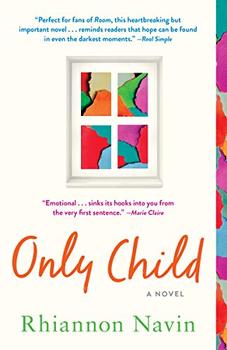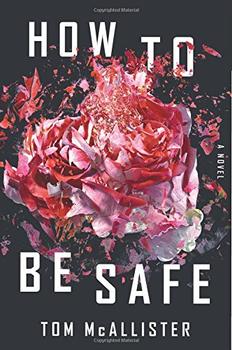Summary | Excerpt | Reading Guide | Reviews | Beyond the book | Read-Alikes | Genres & Themes | Author Bio

A Novel
by Jodi PicoultIn her latest emotionally charged novel Jodi
Picoult delves beneath the surface of small town America to
explore the ubiquitous issue of school bullying and the less
ubiquitous but increasingly frequent result of such bullying - a
school massacre. Peter Houghton has endured 12 years of bullying
at the hands of his peers, starting on his first day of
kindergarten. His older brother is no support, in fact he's part
of the problem; the school effectively does nothing; and Peter
stopped trying to confide in his well-meaning but misguided parents after his mother threatened to stop
him playing with the only friend he had in kindergarten (Josie
Cormier) if he didn't toughen up and stand up to the bullies.
As a result, slightly built and bespectacled Peter withdraws
into a world of video games and computer programming, designing
increasingly violent fantasy games and collecting real weapons,
made easier because his father keeps guns in the house
and Peter, of course, knows where the keys are kept. One day,
following a final assault to his fragile ego, he walks into
school and opens fire. With hundreds of witnesses and CCTV
recordings of his actions, the fact that he was the one holding
the gun is not in question. However, can he be held fully
responsible for his actions, or does his attorney have a case
when he likens Peter to an an abused wife suffering from Post
Traumatic Stress Disorder, who kills her husband in self-defense
while he sleeps?
Told as a series of flashbacks from multiple points of view,
Nineteen Minutes is a powerful read that kept me up until
3am. As always with Picoult, the issues are never black and
white and the plot is never quite as simple as it might at first
seem. Readers looking for easy answers won't find them in these
pages. While virtually no character comes out as blameless in
Nineteen Minutes, Picoult does not point the finger exclusively at any one individual or group - not Peter nor the
bullies who drove him to take revenge; not the school system nor
the parents who, arguably, let Peter down. However, she
does find society as a whole at fault - a society that talks
about inclusiveness and the American "melting-pot" but cannot
tolerate differences; a society that allows impressionable young
people access to extraordinarily violent images via computer
games and TV, and then puts them in the position to easily
obtain the weapons to carry out their fantasies.
One of the links in the sidebar is to a timeline of worldwide
school shootings since 1996. It will be unlikely to surprise any
reader to learn that the vast majority of these shootings have
taken place in the USA. The few that have taken place elsewhere
tend to be on a much smaller scale, or took place in a school
but the perpetrator was not a child (such as 1996 massacre at Dunblane Elementary School in Scotland).
Picoult says she was drawn to write about a school shooting
because, as the mother of three, she has seen her own children
struggle with fitting in and being bullied. She also kept
thinking about how it's "not just in high school where we have
this public persona that might be different from what we truly
feel inside...everyone wonders if they're good enough, smart
enough, pretty enough, no matter how old they are. It's an
archetypical moral dilemma - you act like yourself, and risk
becoming an outcast? Or do you pretend to be someone you're not,
and hope no one finds out you're faking?"
She says that Nineteen Minutes was a very hard book to
research, she spent time talking with the Jefferson County
Sheriff's Office who investigated the Columbine shootings and
provided her with materials which helped her get into the
mindset of the shooters. She also spoke with a grief counselor
to the families who lost children at Columbine, and to survivors
of the Rocori shootings in Minnesota. One of the truths that
struck her during her research is that while the media are quick
to list the aberrant characteristics of a school shooter, the
reality is that "they fit all teens at some point in their
adolescence." Two other facts surprised her; the first being
that for many shooters there is the thinnest line between
suicide and homicide - they go to the school planning to kill
themselves and decide at the last minute to shoot others, too;
and that, psychologically, a single act of childhood bullying is
as scarring emotionally as a single act of sexual abuse.
"I know that many of my readers are the age of the young characters in this book, and over the years, some have written me to ask if I'd write a book about bullying. But it wasn't until I began to connect what kids experience in school with how adults treat other adults who are somehow different that I began to piece together the story. Discrimination and difference at the high school level will never end until the adults running these schools can go about their own lives without judging others for their race, religion, sexual orientation, etc. How ridiculous is it that America prides itself on being a melting pot, when -- as Peter says in the novel -- that just means it makes everyone the same?" - Jodi Picoult.
Interesting to note:
"If I could say one thing to the legions of teens out there who wake up every morning and wish they didn't have to go to school, it would be this -- and I'm saying it as both a mom and a writer: Stay the course. You WILL find someone like you; you WILL fit in one day. And know that even the cool kids, the popular kids, worry that someone will find out their secret: that they worry about fitting in, just like you do." - Jodi Picoult
![]() This review was originally published in The BookBrowse Review in February 2007, and has been updated for the
February 2008 edition.
Click here to go to this issue.
This review was originally published in The BookBrowse Review in February 2007, and has been updated for the
February 2008 edition.
Click here to go to this issue.

If you liked Nineteen Minutes, try these:

by Rhiannon Navin
Published 2019
For fans of Room and the novels of Jodi Picoult, a dazzling, tenderhearted debut about healing, family, and the exquisite wisdom of children, narrated by a six-year-old boy who reminds us that sometimes the littlest bodies hold the biggest hearts, and the quietest voices speak the loudest.

by Tom McAllister
Published 2018
We Need to Talk about Kevin meets Dept. of Speculation in a novel about one woman's furious grappling with the repercussions of small-town tragedy.
Your guide toexceptional books
BookBrowse seeks out and recommends the best in contemporary fiction and nonfiction—books that not only engage and entertain but also deepen our understanding of ourselves and the world around us.